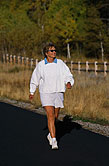
TUESDAY, Nov. 6 (HealthDay News) — It seems your grandmother was right after all — if you want to live a longer and healthier life, be sure to exercise.
A new study by researchers at the U.S. National Cancer Institute found that staying physically active after age 40 seems to increase your lifespan between two and seven years. And the more you exercise, the longer your life expectancy — regardless of your weight.
“There is dose-response relationship between physical activity and life expectancy,” said investigator Steven Moore, a National Cancer Institute research fellow. “If you don’t currently do any physical activity, doing just a few minutes of physical activity a day can result in a notable increase in life expectancy.”
Exercise may extend life by helping to prevent often fatal diseases, Moore said, adding that other studies have linked physical activity to a lower risk for heart disease and several cancers.
The bottom line, he said: “Some physical activity is good, more is better.”
For the study, published online Nov. 6 in the journal PLoS Medicine, Moore and his colleagues pooled data from six previously published studies that included more than 650,000 people. Using this data, the researchers were able to calculate the years of life gained after age 40 from various levels of physical activity.
The researchers found that a small increase physical activity — such as brisk walking for about 75 minutes a week — added 1.8 years of life. That’s a 19 percent decrease in the risk of dying compared with not doing any exercise, the researchers said.
For those who walked 150 to 299 minutes a week, which is the amount of physical activity recommended by the U.S. government, the gain in life expectancy was 3.4 years, the study authors found.
More vigorous activity, such as walking up to 450 minutes a week added 4.5 years of life.
Gains in lifespan were seen for all people, whether they were normal weight, overweight or obese, the researchers added.
The biggest increase in life expectancy was 7.2 years for those of normal weight and who exercised at the levels recommended by the U.S. government, compared to an obese person who didn’t exercise, the study found.
Dr. David Katz, director of Yale University’s Prevention Research Center, called the new research a “study of profound importance, with a message both compelling and clear: exercise can add years to your life.”
Although the study was “observational,” meaning it has limitations that could influence the findings, its size and careful control for important variables — such as tobacco and alcohol use — made the conclusions reliable, Katz said.
“We see yet again in this large and truly dramatic report that exercise is the best medicine we have,” he said.
The greatest increase in life expectancy — more than seven years — was seen in people who were both routinely active and had a body-mass index (a ratio of weight to height) in the recommended range, Katz added.
“The study reaffirms the importance of weight control as well,” he said.
More information
For more on exercise, visit the U.S. National Library of Medicine.

